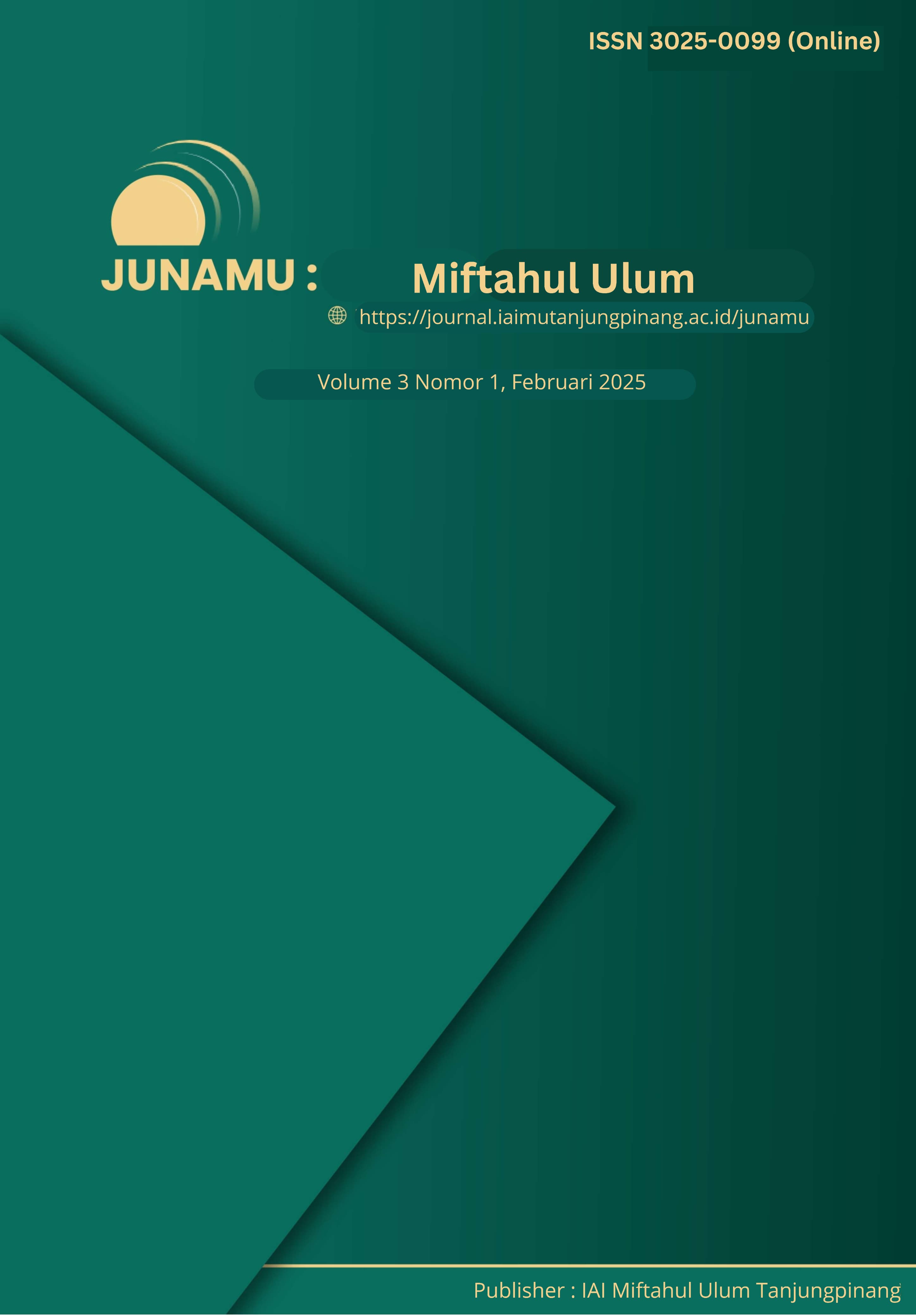Implementasi Prinsip Syariah Dalam Produk Digital Banking Bank Jago Syariah
DOI:
https://doi.org/10.64405/jm.v3i1.110Abstract
This study aims to analyze the implementation of sharia principles in the digital banking products offered by Bank Jago Syariah. With the rapid development of financial technology, Islamic banks face challenges in integrating sharia principles into digital products without violating applicable sharia regulations. This research employs a qualitative approach with descriptive analysis based on secondary data, including annual reports and literature related to digital Islamic products. The findings reveal that Bank Jago Syariah has successfully implemented sharia principles in its digital products, such as murabahah financing and sharia savings, by avoiding elements of riba, gharar, and maysir. However, the study also identifies significant challenges related to customer understanding of sharia contracts in digital transactions and potential risks to data security. Additionally, there are limitations in the accessibility of digital products for customers with low technological literacy, potentially hindering financial inclusion. The impact of digital technology adoption on financial inclusion shows mixed results, as technology-savvy segments benefit significantly, while those with low digital literacy still face barriers in utilizing these services. The digital Islamic products offered by Bank Jago Syariah tend to be underutilized by customers who do not fully understand the contracts used. Despite the advanced technology employed, data protection issues remain a concern. This study recommends that Bank Jago Syariah enhance customer education regarding digital Islamic products and strengthen security systems to reduce uncertainty and improve transparency. Furthermore, strategies to enhance financial inclusion through simplified technology access for less tech-savvy customers need to be developed. The adoption of technologies such as blockchain is also proposed to improve accountability, transparency, and compliance with sharia principles.
Keywords: Sharia Principles; Digital banking; Bank Jago Syariah; Data Security
References
Adenia, N., Alifia Nur Zaida, & Hasanah Listiyanti. (2022). Analysis of Intention To Use Sharia Digital banking Using Tam 3 and Utaut Theory. Airlangga International Journal of Islamic Economics and Finance, 5(02), 83–103. https://doi.org/10.20473/aijief.v5i02.42361
Alwi, M. N., Fitriana, B., Agil, R., Andriani, M., & Semmawi, R. (2024). Tantangan dan Peluang Perbankan Digital: Studi Kasus Inovasi Keuangan dan Transformasi Perbankan. Jurnal Cahaya Mandalika, 3(2), 2160–2177. https://doi.org/10.36312/jcm.v3i2
Amrillah, M. U. (2020). Urgensi Pembentukan Undang-Undang Digital banking Bagi Perbankan Syariah Di Indonesia. Jurnal Lex Renaissance, 5(4), 928–945. https://doi.org/10.20885/jlr.vol5.iss4.art12
Andriani, W., Surya, F., & Zahara, Z. (2024). Menilai Kinerja Keuangan Perbankan Syariah di Bursa Efek Indonesia: Pendekatan Analisis Rasio dan Common Size. ISTIKHLAF: Jurnal Ekonomi, Perbankan Dan Manajemen Syariah, 6(2), 17–33. https://doi.org/10.51311/istikhlaf.v6i2.653
Aprila, D., Andriani, W., & Ananto, R. P. (2023). Financial Management of Nagari Owned Enterprises (BUMNAG) and Its Impact on Community Welfare. Jurnal Akuntansi Bisnis, 16(2), 210–225. https://doi.org/10.30813/jab.v16i2.4461
Assari, E., Hamidah, S., & Dewantara, R. (2022). the Legal Status of Digital Banks in Indonesia. Jurisdictie: Jurnal Hukum Dan Syariah, 13(2), 264–293. https://doi.org/10.18860/j.v13i2.16285
Chauhan, S., Akhtar, A., & Gupta, A. (2022). Customer experience in digital banking: a review and future research directions. International Journal of Quality and Service Sciences, 14(2), 311–348. https://doi.org/10.1108/IJQSS-02-2021-0027
Fatikhoh, E. (2022). Pengaruh Konsep Manajemen Syariah Terhadap Bank Digital. Jurnal Justisia Ekonomika: Magister Hukum Ekonomi Syariah, 6(2), 339–343. https://doi.org/10.30651/justeko.v6i2.15694
Fatimah, S. B., & Hendratmi, A. (2020). Digitalisasi Pada Bank Mandiri Syariah Di Tengah Persaingan Dan Perubahan Teknologi. Jurnal Ekonomi Syariah Teori Dan Terapan, 7(4), 795. https://doi.org/10.20473/vol7iss20204pp795-813
Gustati, G., Rahmiati, D., & Sulastri, R. E. (2023). Literasi Keuangan Syariah Sebagai Pemoderasi Religiusitas Dalam Mempengaruhi Minat Menggunakan Produk Keuangan Syariah. Jurnal Akuntansi Keuangan Dan Bisnis, 16(1), 100–109. https://doi.org/10.35143/jakb.v16i1.5946
Khuan, H. (2022). Analysis of Competitiveness for Market Share Expansion of Pt Bank Jago Tbk. Journal of Social Research, 1(3), 221–230. https://doi.org/10.55324/josr.v1i3.57
Linggadjaya, R. I. T., Sitio, B., & Situmorang, P. (2022). Transformasi Digital Pt Bank Jago Tbk dari Bank Konvensional menjadi Bank Digital. International Journal of Digital Entrepreneurship and Business, 3(1), 9–22. https://doi.org/10.52238/ideb.v3i1.76
Muhammad Ismail Sha Maulana, Muhammad Firdan, Sofia Rachmah Sabilla, & Abdul Hakam. (2022). Perkembangan Perbankan Syariah Di Era Digitalisasi. IQTISADIE: Journal of Islamic Banking and Shariah Economy, 2(1), 85–110. https://doi.org/10.36781/iqtisadie.v2i1.225
Nurfalah, I., & Rusydiana, A. S. (2019). Digitalisasi Keuangan Syariah Menuju Keuangan Inklusif: Kerangka Maqashid Syariah. Ekspansi: Jurnal Ekonomi, Keuangan, Perbankan Dan Akuntansi, 11(1), 55. https://doi.org/10.35313/ekspansi.v11i1.1205
Parapat, E., Pebriansya, A., & Prayogo, I. (2024). Transformasi Digital dalam Sistem Informasi Perbankan Syari’ah: Masa Depan Keuangan yang Berkelanjutan. Jurnal Sistem Informasi Dan Ilmu Komputer, 2(1), 49–60. https://doi.org/10.59581/jusiik-widyakarya.v2i1.2205
Pratama, S., & Shabri, H. (2024). Analisis Tingkat Kesehatan Bank Nagari Syariah Menggunakan Metode RGEC. Al-Bank: Journal Islamic Banking and Finance, 2(2), 196–215. https://doi.org/10.47080/al-bank.v7i1.3164
Siska, E. (2023). Digital Bank Financial Performance Analysis at PT Bank Jago Tbk: Economic Value Added (EVA) Approach. Ekonomi Dan Bisnis, 10(2), 17–30. https://doi.org/10.35590/jeb.v10i1.6286
Siska, E., Sebastian, D. R., & Islami, V. (2024). A ssessing the Financial Performance of Digital Sharia Bank at Bank Aladin Syariah : EVA and MVA Approach. Jurnal Ilmiah Ekonomi Islam, 10(02), 1308–1315. https://doi.org/10.29040/jiei.v10i2.13351
Syahza, A. (2021). Metodologi Penelitian (Edisi Revisi Tahun 2021) (Issue September). Unri Press. https://www.researchgate.net
Vanni, K. M., & Nadan, V. S. (2023). Efektivitas Strategi Pemasaran Digital banking Bank Syariah Di Indonesia. Jurnal Ilmiah Mahasiswa Perbankan Syariah (JIMPA), 3(2), 237–248. https://doi.org/10.36908/jimpa.v3i2.197
Wahyudin, R., Wira, A., & Lubis, M. Z. M. (2022). Rationality of The Bank Nagari Conversion: Perspective Analysis of “Tigo Tungku Sajarangan .” EKONOMIKA SYARIAH : Journal of Economic Studies, 6(2), 136. https://doi.org/10.30983/es.v6i2.6027
Yasin, R. M., Lailyah, N., & Edris, M. (2021). Analisis Pengaruh Layanan Digital Perbankan Syariah terhadap Literasi Keuangan Syariah Generasi Milenial. Jurnal BAABU AL-ILMI: Ekonomi Dan Perbankan Syariah, 6(1), 75. https://doi.org/10.29300/ba.v6i1.4117












